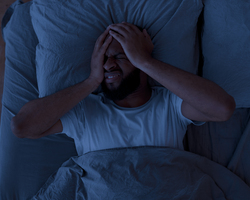 Depression affects millions of Americans, each of them in a different way. Though anyone with depression may have trouble recognizing the disease or asking for help, these steps can be especially difficult for men.
Depression affects millions of Americans, each of them in a different way. Though anyone with depression may have trouble recognizing the disease or asking for help, these steps can be especially difficult for men.
Compared with women, men are less likely to get treatment for depression. Men's symptoms also tend to differ from some of the symptoms often associated with the disease, according to the National Institute for Mental Health (NIMH).
Many men worry that a diagnosis of depression will affect how family, friends and their community view them.
For all of these reasons and more, too many of the men in the U.S. who have depression aren't getting treated. Avoiding treatment can put a man through years of needless suffering. It can also endanger his life.
For the sake of quality and quantity of life, every man with signs of depression should talk to a doctor.
Different for him
Men with depression may not always seem sad. Instead, some men may become angry or irritable, according to the NIMH. They may feel tired a lot, lose interest in hobbies or work, and sleep too much or too little.
Men are also more likely than women to cope with depression by turning to alcohol or drugs, which can mask depressive symptoms. Other men may start acting very recklessly or become abusive.
When depression sets in
Depression in men (and women) can have many causes. Some men may become depressed after going through stressful life events, such as:
- Loss of a loved one.
- Money problems.
- Relationship difficulties, such as divorce.
- Work troubles.
- Health problems.
Other possible risk factors for male depression include lack of social support; alcohol or other substance abuse; abuse or other trauma in early childhood; and aging alone.
A family history of depression also puts a man at higher risk.
A full-body illness
Regardless of what causes it, research shows that the effects of depression go far beyond feelings.
This disease affects many parts of the body, including brain structure or function, the cardiovascular system, and the immune system. It affects thoughts, appetite and sleep. And it may cause physical symptoms, like headaches, digestive problems and chronic pain.
What's more, depression can complicate or intensify chronic diseases, such as heart disease and diabetes.
According to the NIMH, men are also at much higher risk for the worst possible outcome of depression.
Treatment can help
In almost all cases, living with depression is unnecessary. Most people who get treated for depression can feel better again.
Treatments for depression may include counseling (talk therapy), antidepressant medications or both.
Seeking treatment for depression is no different than seeking treatment for heart disease, diabetes, cancer or any other serious illness. In all cases, your health and possibly your life are on the line.
Get the help you need and deserve
If you have symptoms of depression that have lasted at least two weeks or are severe enough to interfere with day-to-day activities, it's time to see a doctor.
According to experts, symptoms of depression can include:
- A sad, anxious, restless or empty mood.
- Feeling hopeless or helpless.
- Losing interest in activities that were once enjoyed.
- Always feeling tired or slowed down.
- Having trouble concentrating or remembering details.
- Thoughts of death or suicide.
Some of these symptoms could be side effects from a medicine you're taking or signs of another medical condition besides depression.
If it is depression, your doctor can offer you effective treatment options. Getting the help you deserve is a sign of strength—not weakness.
Support him
Loved ones are often the first to spot the signs of depression in a man. If you care about a guy who seems depressed, talk to him about the disease and encourage him to see a doctor.
If all else fails, make the appointment yourself and go with him. It could save his life.
Learn more about depression
To find out more about depression, visit our Depression health topics center.
Reviewed: 10/18/2023